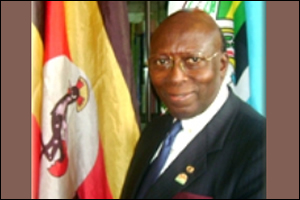Uganda: Interview with HE Stephen T.K Katenta - Apuli
HE Stephen T.K Katenta - Apuli
Ambassador Extraordinary & Plenipotentiary of the Republic of Uganda to Belgium (Embassy of the Republic of Uganda in Brussels)
2011-04-25
His Excellency Yoweri Museveni, President of the Republic of Uganda, won the February election with over 68% of the vote. This is surely a great success. What is the government’s main objective in terms of economic and social development?
The government’s main objective is to increase the incomes of every household in Uganda. We realized that in order to fight poverty we need to do more than building infrastructures or improving health facilities. These are certainly among our priorities. However, the most important factor is to provide people with a regular, steady and predictable source of income through which they can plan and improve their lives.
What is the strategy that the government is implementing in order to achieve this objective?
The government has been a major partner in cooperative development in Uganda. The strategy is to develop and strengthen the cooperative movement in order to make it become a source of employment creation, social economic transformation and ultimately poverty alleviation. To this end the government provide financial funds to saving and credit cooperatives because it recognizes them to be significant drivers in the mobilization of people, in the enhancement of production and in capital accumulation
As a landlocked country, land transport (roads) is the main mode of transport in Uganda, it occupies more than 92% of cargo and passenger traffic and it plays a pivotal role in supporting development programmes. Therefore the maintenance and the development of a national road network are critical. Could you tell us more about what the government is doing in terms of infrastructure development?
Infrastructure development in Uganda is managed both through the 5 years national plan for infrastructure development and through the East African Community Transport Strategy and Road Sector Development. The East African Community has agreed to repair and improve what we call the Northen Corridor which goes through Mombasa, Nairobi into Kampala as well as the Central corridor which goes from Dar-Es-Salaam to its northern and western neighbors including Uganda. Moreover, in during the Kigali summit it was agreed that 15% of the national budgets of each country should be allocated for infrastructure development.
Do you think that events like the CCA conference can play an important role in enhancing cooperation between countries?
Yes absolutely. For example, we hosted a small conference called “SMAC Partnership” which was organized by the Commonwealth Group of countries and it was an occasion when leaders came together and spoke as human beings rather than as leaders. They took their ties off and spoke openly, sometimes even aggressively, to each other, in order to verify if and how we can help each other. These kinds of meetings are very useful and we will be happy to host one of the CCA conferences one day in Uganda.
I would now like to talk about the Oil Sector. How important do you think it is for Ugandan development the recent discovery of the equivalent of 2 billion barrels of oil in the Lake Albert?
The discovery of oil in Uganda is of major importance for the country’s development. We are determined to make sure that the discovery of oil does not turn into a curse, as many people are predicting. It will not be a cursed Uganda; it will be a blessed Uganda. We are going to use our oil revenues wisely to develop infrastructure, to improve education, to add values to our own resources, especially in agriculture, and to invest in all those areas that can contribute to social and economic development.
According to Prof. Maggie Kigozi, Executive Director of the Ugandan Investment Authority, the aim is to attract investment into the added value activities such as the manufacturing sector and the financial sector. In your opinion, how important it is for Uganda to attract FDI? And What strategy is the government implementing to attract FDI?
We are reforming the current regulatory system relating to foreign investments. In many occasion Uganda has been ranked among the 5 best countries in Africa for its attractive investment regime. We have managed to maintain macroeconomic stability and to control inflation in order to make sure that people investing in Uganda get a positive return on investment. Value addition is also very important for a landlocked country. It is crucial for Uganda to attract more FDI because we need to spur job creation. Many qualified Ugandans are graduating from our Universities. We need to make job opportunities available for them otherwise we risk growing unrest as it happened in Tunisia and Libia.
What message would you like to send to those international investors who are interested in coming to Uganda?
I would like to say to them that Uganda is a good destination and a safe place to do business. The profits on new investments have been above average and this is because the country’s GDP has been growing consistently at an average rate of 6 – 7% per year.
